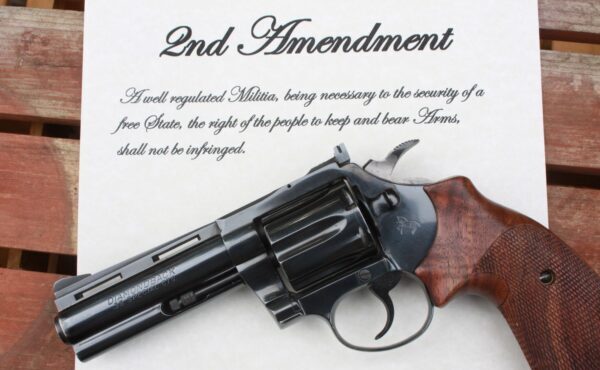
By Dave Workman
Editor-in-Chief
For the second time, the Third U.S. Circuit Court of Appeals has ruled in favor of a Pennsylvania man seeking Second Amendment protection despite a felony conviction years of ago for lying on a food stamp application, a decision for which an earlier ruling appears to have blazed the trail.
In a 13-2 decision, an en banc panel of the Third Circuit said Monday Bryan Range—who pleaded guilty in 1995 to one count of making a false statement to obtain food stamps in violation of Pennsylvania law—remains among “the people” protected by the Second Amendment.
Attorney Mark W. Smith, host of the Four Boxes Diner podcast, is calling the decision a “massive victory” for Second Amendment rights.
Writing for the court, Circuit Judge Thomas Hardiman, a George W. Bush appointee, explained, “The en banc Court reversed and remanded for the District Court to enter a declaratory judgment for Range. We concluded that Range remained one of ‘the people’ protected by the Second Amendment and that the Government did not show the Nation has a longstanding history and tradition of disarming people like Range.”
The government appealed to the U.S. Supreme Court, and while that petition for certiorari was pending, the Court decided the case of U.S. v. Rahimi, a case involving a domestic violence restraining order and the subsequent use of firearms in a series of violent incidents in Arlington, Texas. Under the protective order, Zackey Rahimi could not possess firearms. He argued the prohibition violated his Second Amendment rights.
However, as noted by Oyez.org, the high court ruled that “When an individual has been found by a court to pose a credible threat to the physical safety of another, that individual may be temporarily disarmed consistent with the Second Amendment.”
However, in the Pennsylvania case, Range was not guilty of a violent crime. As explained by Judge Hardiman in the majority opinion, “When Range pleaded guilty in 1995, his conviction was classified as a Pennsylvania misdemeanor punishable by up to five years’ imprisonment. That conviction precludes Range from possessing a firearm because federal law generally makes it “unlawful for any person . . . who has been convicted in any court, of a crime punishable by imprisonment for a term exceeding one year” to “possess in or affecting commerce, any firearm or ammunition.”
“Although state misdemeanors are excluded from that prohibition if they are “punishable by a term of imprisonment of two years or less,” the judge added, “that safe harbor provided no refuge for Range because he faced up to five years’ imprisonment.
“In 1998, Range tried to buy a firearm but was rejected by Pennsylvania’s instant background check system. Range’s wife, thinking the rejection a mistake, gifted him a deer-hunting rifle. Years later, Range tried to buy a firearm and was rejected again. After researching the reason for the denial, Range learned he was barred from buying a firearm because of his 1995 conviction. Range then sold his deer-hunting rifle to a firearms dealer.
“In 2020,” Judge Hardiman’s narrative continues, “Range sued in the United States District Court for the Eastern District of Pennsylvania, seeking a declaration that § 922(g)(1) violates the Second Amendment as applied to him.”
“The Third Circuit Court agrees.”
It is likely that a case supported by the Second Amendment Foundation in Pennsylvania known as Binderup v. Attorney General of the U.S. blazed the trail followed by Range in the Third Circuit. In that case, the Third Circuit held that § 922(g)(1) is unconstitutional as applied” to the plaintiff in that case, Daniel Binderup.
In 1996, according to the court, Binderup began a consensual sexual relationship with a 17-year-old female who worked at his bakery. At the time, Binderup was 41 and the legal age of consent in Pennsylvania was 16. Still, she was a minor, and Binderup ended up in court, where he pleaded guilty to a charge of corrupting a minor, a misdemeanor punishable by possible imprisonment for up to five years. Binderup was on probation for three years and he was fined $300 and he paid court costs and restitution. Since then, he had no subsequent offenses.
While Pennsylvania law disqualified Binderup from owning or possessing firearms due to the conviction, the court noted in its decision, he successfully petition Pennsylvania courts to remove the prohibition. Still, under federal law, Binderup remained disqualified from gun ownership. The Third Circuit ruling favored Binderup, and when the government appealed to the Supreme Court, its petition for certiorari was declines, so Binderup’s Third Circuit decision was allowed to stand.
At the time, SAF founder and Executive Vice President Alan Gottlieb stated, “We established the principle that people who are convicted of certain misdemeanor crimes cannot be stripped of their fundamental right to keep and bear arms for life.”
That decision appears to have established the precedent which has allowed the Range case to proceed.
What happens now? According to attorney Smith at Four Boxes Diner, a Supreme Court review could lead to a decision which will enable Range and others in the same predicament to retain their Second Amendment rights despite conviction of certain non-violent felonies.
“This is a huge victory for non-violent felons,” Smith says in his broadcast, “because as you know what has been going on the Congress and the states have been playing games broadly defining all sorts of nonsense as felonies, which means that people convicted of things…and next thing you know they’ve lost their right to keep and bear arms forever.”
Smith expressed hopes that the Justice Department under Donald Trump will seek Supreme Court review of this case “because I think the fact pattern presented by this case is very favorable to the Second Amendment.”



